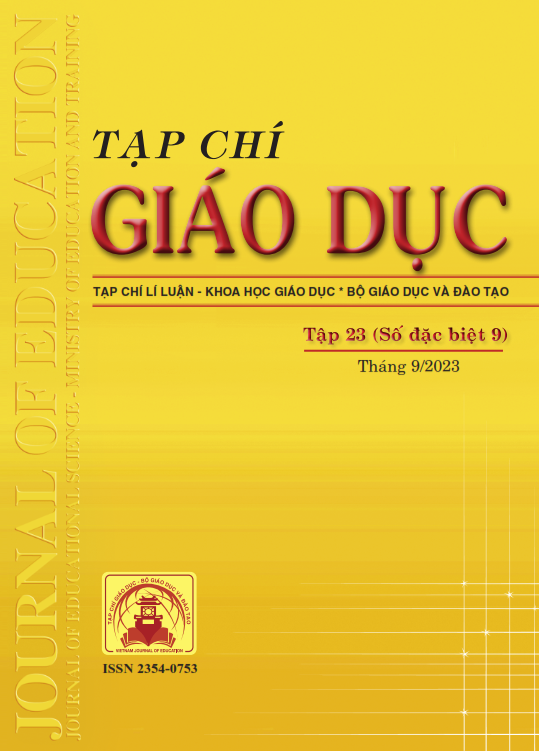Thúc đẩy hoạt động nghiên cứu khoa học theo hướng tạo ra tác động xã hội trong các cơ sở giáo dục đại học
Tóm tắt
Scientific research is of special importance in higher education because it not only contributes to improving training quality but also creates new knowledge and new products. The article assesses the social impact of scientific research and analyzes the role of higher education institutions and researchers in promoting scientific research that creates social impact. Research results show that conducting research that creates social impact is an important trend that helps higher education institutions demonstrate their responsibilities to the community. There are many different ways to assess and measure the social impact of scientific research in terms of scientific, economic, cultural, practical, environmental, educational, public policy, quality of life. Higher education institutions need to play a central role in promoting scientific research that creates social impact through a variety of measures, from changing research strategies to developing operating regulations and creating and create a motivating environment. Besides, researchers themselves also need to have the mindset, interest and commitment to carry out research projects that create social impact.
Tài liệu tham khảo
Alvesson, M., Gabriel, Y., & Paulsen, R. (2017). Return to meaning: A social science with something to say. Oxford University Press.
AUBR (2010). Assessing Europe’s university-based research. European Commission. Expert Group on the Assessment of University-Based Research. Luxembourg: Publications Office of the European Union. https://ec.europa.eu/research/science-society/document_library/pdf_06/assessing-europe-university-based-research_en.pdf
Belcher, B. M., Davel, R., & Claus, R. (2020). A refined method for theory-based evaluation of the societal impacts of research. METHODSX, 7, 100788. https://doi.org/10.1016/j.mex.2019.08.013
Clark, W. C., Van Kerkhoff, L., Lebel, L., & Gallopin, G. C. (2016). Crafting usable knowledge for sustainable development. Proceedings of the National Academy of Sciences, 113(17), 4570-4578.
D’Este, P., Ramos-Vielba, I., Woolley, R., & Amara, N. (2018). How do researchers generate scientific and societal impacts? Toward an analytical and operational framework. Science and Public Policy, 45(6), 752-763. https://doi.org/10.1093/scipol/scy023
De Silva, P. U. K., & Vance, C. K. (2017). Assessing the societal impact of scientific research. In Scientific Scholarly Communication: The Changing Landscape, 117-132. Springer.
Donovan, C. (2007). The qualitative future of research evaluation. Science and Public Policy, 34(8), 585-597.
Donovan, C. (2008). The Australian research quality framework: A live experiment in capturing the social, economic, environmental and cultural returns of publicly funded research. New Directions for Evaluation, 118, 47-60.
Janinovic, J., Pekovic, S., Vuckovic, D., Popovic, S., Djokovic, R., & Pejić-Bach, M. (2020). Innovative strategies for creating and assessing research quality and societal impact in social sciences and humanities. Interdisciplinary Description of Complex Systems, 18(40), 449-458. https://doi.org/10.7906/indecs.18.4.5
Muhonen, R., Benneworth, P., & Olmos-Penuela, J. (2020). From productive interactions to impact pathways: Understanding the key dimensions in developing SSH research societal impact. Research Evaluatıon, 29(1), 34-47. https://doi.org/10.1093/reseval/rvz003
Nikina, A., Piqué, J., & Miquel, J. (2016). Areas of innovation in a global world: Concept and practice. Campanillas: IASP.
Noyons, E. (2019). Measuring societal impact is as complex as ABC. Journal of Data and Information Science, 4(3), 6-21. https://doi.org/10.2478/jdis-2019-0012
Olsson, A. K., Bernhard, I., Arvemo, T., & Snis, U. L. (2020). A conceptual model for university-society research collaboration facilitating societal impact for local innovation. European Journal of Innovation Management, 24(4), 1335-1353.
Păunescu, C., Nikina-Ruohonen, A., & Stukalina, Y. (2022). In C. Păunescu, K. Lepik, N. Spencer (eds.), Social Innovation in Higher Education, Innovation, Technology, and Knowledge Management: Landscape, Practices, and Opportunities. Springer. https://doi.org/10.1007/978-3-030-84044-0_8
Powell, P., & Walsh, A. (2018). Mutualising the university: Achieving community impact through an ecosystem. International Review of Education, 64(5), 563-583.
Rau, H., Goggins, G., & Fahy, F. (2018). From invisibility to impact: Recognising the scientific and societal relevanceof interdisciplinary sustainability research. Research Policy, 47(1), 266-276. https://doi.org/10.1016/j.respol.2017.11.005
Sivertsen, G., & Meijer, I. (2020). Normal versus extraordinary societal impact: How to understand, evaluate, and improve research activities in their relations to society? Research Evaluatıon, 29(1), 66-70. https://doi.org/10.1093/reseval/rvz032
Spaapen, J., & Sivertsen, G. (2020). Assessing societal impact of SSH in an engaging world: Focus on productive interaction, creative pathways and enhanced visibility of SSH research. Research Evaluation, 29(1), 1-3. https://doi.org/10.1093/reseval/rvz035
Spaapen, J., & Van Drooge, L. (2011). Introducing ‘productive interactions’ in social impact assessment. Research Evaluation, 20(3), 211-218.
Tahamtan, I., & Bornmann, L. (2020). Altmetrics and societal impact measurements: Match or mismatch? A literature review. Profesional de la Informacion, 29(1), e290102. https://doi.org/ 10.3145/epi.2020.ene.02
Đã Xuất bản
Cách trích dẫn
Số
Chuyên mục
Giấy phép

Tác phẩm này được cấp phép theo Ghi nhận tác giả của Creative Commons Giấy phép quốc tế 4.0 .












